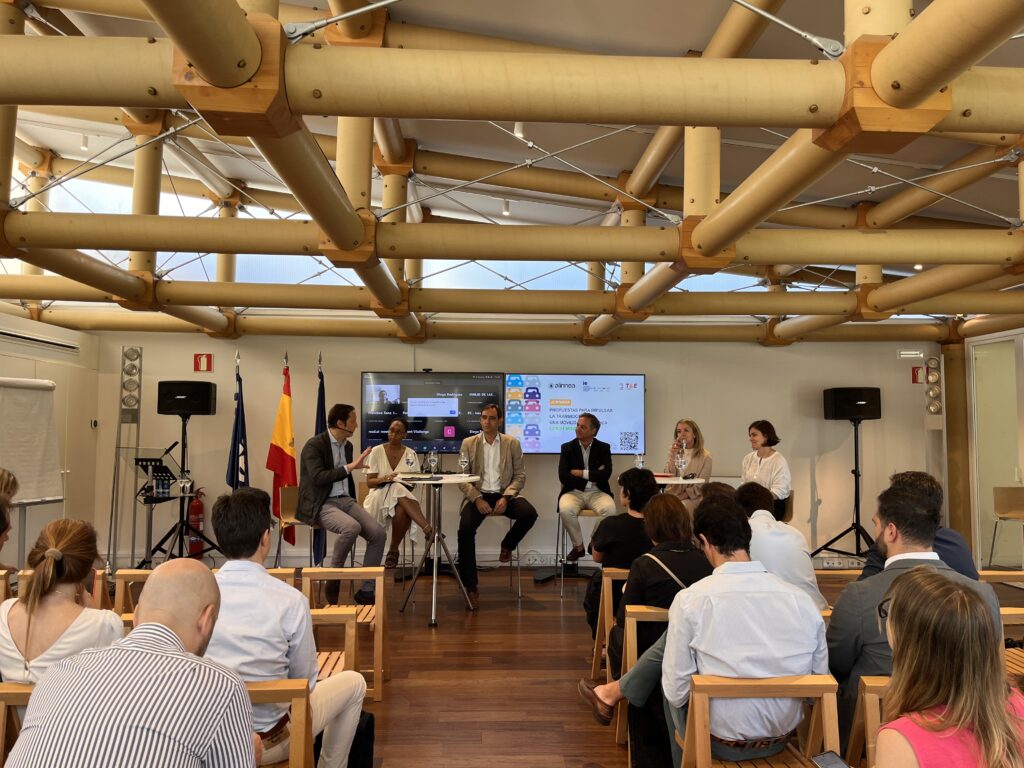Home / Experts analyze the challenges of electric mobility in the face of the climate crisis

Zero-emission mobility has become a top priority for the automotive industry in response to climate change. This challenge was the focus of the forum “Proposals to Accelerate the Transition to Zero-Emission Electric Mobility,” organized by Alinnea together with the IE Center for Transport Economics & Infrastructure Management and T&E (Transport & Environment), the European organization that promotes clean, sustainable transport policies.
During the event, participants presented the conclusions of the report Value Chains Driven by the Electrification of Mobility in Spain, developed by T&E in collaboration with Alinnea. They also set out the recommendations from Analysis of Electric Mobility in Spain: Current status, challenges, and Proposals for increasing electric vehicle penetration, the outcome of sessions held by Alinnea’s multi-stakeholder working group on electric vehicles.
The opening session featured remarks from the partner organizations, who shared their views on the state of electric mobility in Spain, addressing key aspects such as regulation, incentive schemes, and the main challenges and opportunities. Ana Belén Sánchez, Director of alinnea, stated: “Driving the ecological transition through transport electrification is a major challenge that cannot be met without the participation of all relevant stakeholders. That is why, at Alinnea, we foster dialogue that allows us to identify barriers to progress and propose solutions.”
Isabell Büschel, Director of T&E in Spain, emphasized: “Maintaining an ambitious industrial policy aligned with the European Green Deal is a historic opportunity for Europe. It would enable the production of 16.8 million electric vehicles per year by 2035, create 220,000 quality jobs, and quintuple the economic value of the European automotive sector to €79 billion. For Spain, this means the chance to become the European hub of electric mobility by attracting more and better investment. All of this will improve air quality and mitigate the adverse effects of road transport on climate change.”
Julio Gómez-Pomar, Director of the IE Center for Transport Economics & Infrastructure Management, noted that “the electric vehicle is an important, transformative solution for sustainable mobility and is a top priority on the agendas of international institutions and national governments—indeed, the first item on many local agendas.”
Following the opening, Laura Vélez de Mendizábal, e-mobility expert at T&E Spain, presented the conclusions of Value Chains Driven by the Electrification of Mobility in Spain. The report reviews Spain’s current EV landscape—regulation, incentives, and barriers to rollout—and offers proposals to accelerate progress. “Meeting today’s climate, economic, and industrial challenges requires an ambitious, strategic vision. The automotive sector must be at the heart of a green reindustrialization, leveraging Spain’s strengths to build a cleaner, more competitive, and more resilient economy,” Vélez de Mendizábal concluded.
For her part, Ana Belén Sánchez presented the proposals from Analysis of Electric Mobility in Spain: Current status, challenges, and Proposals for increasing electric vehicle penetration, Among them, she highlighted the need to design an incentive system that reduces user uncertainty, with a strong emphasis on simplifying and speeding up procedures, as well as improving communication and the promotion of zero-emission transport.
The event brought together experts from the public and private EV ecosystem and civil society, including Hanna Fakir (Fundación Renovables), Ibán Chico de la Felicidad (Head of E-Mobility Commercialization, Naturgy), Íñigo Bilbao (Director, Mobility Lab Vitoria-Gasteiz), María Romera (Director of Regulation and Public Affairs, AEDIVE), and Sonsoles Díaz de Aguilar (Researcher, International Council on Clean Transportation — ICCT). Moderated by Jaime Gil-Robles, sustainable-mobility expert and Alinnea collaborator, the discussion focused on topics such as the availability and signage of charging points, the importance of transparent communication about electric mobility, and EV adoption as a strategic opportunity.
In this regard, María Romera (AEDIVE) highlighted that there are currently more than 47,000 operational public charging points in Spain. However, “the main obstacle is misinformation.” Ibán Chico de la Felicidad (Naturgy) underscored the critical importance of home/at-destination and opportunistic charging. Hanna Fakir (Fundación Renovables) argued that the rollout of charging points should be accompanied by solar-carport parking to support supply with renewable sources. Íñigo Bilbao (Mobility Lab Vitoria-Gasteiz) explained the role of testing and pilot spaces in advancing e-mobility, noting that one key enabler is solid-state lithium batteries, which are safer and offer around 20% longer lifespan. Sonsoles Díaz de Aguilar (ICCT) highlighted Spain’s rapid EV adoption and stressed the need for a greater supply of affordable EV models in the market.